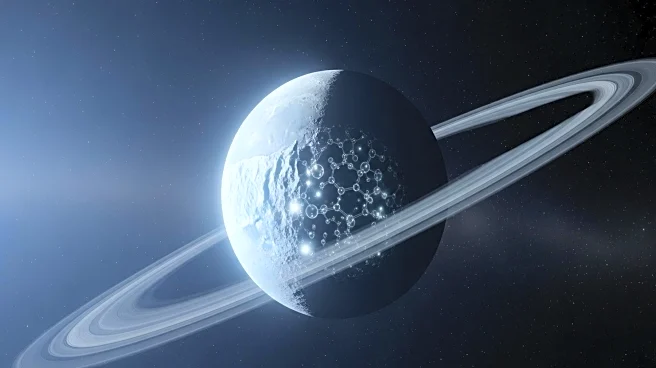What is the story about?
What's Happening?
A new analysis of archival data from the Cassini spacecraft has confirmed the presence of organic molecules in the icy jets of Saturn's moon Enceladus. These molecules, considered key building blocks of life, were found in ice grains sampled directly from the moon's surface. The discovery strengthens the case for Enceladus's hidden ocean being potentially habitable. The Cosmic Dust Analyzer (CDA) on Cassini collected data during flybys, capturing and analyzing ice grains from the plumes erupting from fissures near the moon's south pole. The study, published in Nature Astronomy, resolves previous uncertainties about the origin of these organic compounds, confirming they originated in the subsurface ocean rather than forming after exposure to space radiation.
Why It's Important?
The confirmation of organic molecules originating from Enceladus's ocean is significant as it enhances the moon's potential as a site for extraterrestrial life. This discovery adds to the growing body of evidence suggesting that Enceladus could harbor conditions suitable for life, making it a prime target for future exploration missions. The presence of complex organic compounds, similar to those responsible for life on Earth, suggests that Enceladus's ocean could support biological processes. This finding could influence future space exploration priorities and funding, as international space agencies may focus on missions to further investigate Enceladus's habitability.
What's Next?
Following Cassini's legacy, scientists are considering dedicated missions to Enceladus to search for signs of life. Concepts like NASA's Enceladus Orbilander and a similar mission by the European Space Agency propose orbiting the moon to sample plumes and potentially landing near the south pole to collect surface samples. These missions aim to penetrate the ice and directly sample the liquid ocean, providing more definitive evidence of life. The consensus among space agencies to prioritize Enceladus underscores its potential to answer whether life exists beyond Earth.
Beyond the Headlines
The discovery of organic molecules on Enceladus raises ethical and philosophical questions about the search for extraterrestrial life. It challenges the notion of Earth's exclusivity in hosting life and could lead to a reevaluation of humanity's place in the universe. The potential for life on Enceladus also highlights the importance of protecting such environments from contamination during exploration, ensuring that any findings are genuinely extraterrestrial.

















